|
|
John
Langmore, Director, Division for Social Policy and Development and
Kate Newell, Secretariat
|

|
|
|
Chair Maquieira
speaks with delegates from Libya (left) and Algeria (right)
|
|
Eddy
Lee, Director, International Policy Group, International Labor Organization
(ILO), intervened regarding the issue of definitions of productivity
and efficiency that measure the effectiveness of employment of labor
and show the cost of unemployment and poverty
|
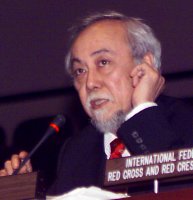
|
 |
Working
Group 3 Chair Bagher Asadi, Iran |
|
Working
Group 2 Chair Koor Richelle (the Netherlands)
|
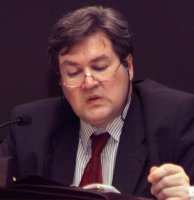 |
|
|
In
Working Group II, the EU discussed Commitment 2, on poverty eradication,
the EU proposed to replace subparagraphs on ways to extend social
protection system coverage and overcome social exclusion, with a bis
paragraph, which invites the International Labor Organization
(ILO ) and others to extend social protection systems to the unprotected |
|
ILO Side Event
Integrating Social and Economic Development: the roles and responsibilities
of the public and private sector
|
|
Eddy
Lee, Director, International Policy Group, ILO, PrepCom Chair Christian
Maquieira, and Janelle Diller, Head of the Voluntary Private Initiatives,
ILO
|
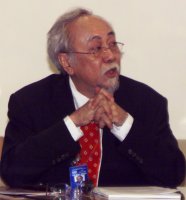 |
Eddy
Lee discussed decent work and poverty reduction in the global
economy and the need for greater policy integration and coherence,
emphasizing that "the integrated problems of sustainable economic
growth and social development cannot be tackled with sectoral solutions,"
a message that should emerge from the Special Session of the General
Assembly. He said the ILOs notion of decent work is an attempt to
apply an integrated approach to policies. He said the ILO's programme
on decent work aims at achieving the following four objectives:
employment creation; promoting basic rights at work; improving social
protection; and promoting a social dialogue.
|
Janelle
Diller discussed the ILO's Private Voluntary Initiatives Programme,
which works to translate the principles underlying ILO's standards
and activities into company practices that promote decent work and
life. It builds on the common ground between efforts to promote
decent work, and initiatives in business social responsibility,
particularly across global supply and service chains. The Programme
offers a framework to equip enterprises to take responsibility and
builds capacity to promote decent work through knowledge sharing,
research, technical services, education, and advocacy. Services
include: access to up-to-date information; virtual and conventional
training modules; and field projects. The Programme serves as the
ILO Secretariat for UN Global Compact, an effort within the UN system
that promotes universal values in business operations worldwide.
Visit the Global Compact website at: www.unglobalcompact.org
For further information on private voluntary initiatives, e-mail:
pvi@ilo.org
|
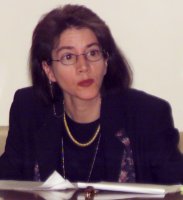 |
UNDP Side Event: Overcoming Human Poverty: UNDP
Poverty Report 2000
UNDP launched
its report at a side event today. The report finds that five years
after the commitments of the WSSD, nations with genuine action plans
to end poverty, remain in the minority. The report concludes that
good economic policies and growth are not enough for poverty reduction,
and that "the 'missing link' between poverty and its reduction
in developing countries and economies in transition is effective governance
institutions. When governments are unaccountable or corrupt, poverty
reduction programmes have little success in targeting benefits. The
report's authors say that a major job of multilateral assistance is
to help countries put effective governance in place.
Visit: www.undp.org/povertyreport |
|
Stephen
Browne, Director of UNDP's Social Development and Poverty Elimination
Division (SDPED), Mark Malloch Brown, UNDP Administrator, Eimi Watanabe,
Assistant Administrator, and Terry McKinley, Coordinator, UNDP Poverty
Report 2000
|
|
|
Mark
Malloch Brown, UNDP Administrator, said that the aim should be
to help build up the capacities of governments, at both national and
local levels, to assume control and direct their own poverty initiatives,
and that this was the vitally important capacity-building agenda for
external assistance. |
 |
Terry McKinley,
Report Coordinator
The main messages
of the report are: commitments to poverty reduction; developing
national anti-poverty plans; linking poverty to national policies;
linking countries' international policies to poverty; responsive
and accountable institutions of governance; pro-poor local governance;
self-organization of the poor at the community level; focusing resources
on the poor; integrating poverty programmes; and monitoring progress
against poverty.
|
 |
Eimi
Watanabe, UNDP Assistant Administrator, and Stephen Browne, UNDP
|
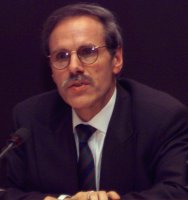 |

 Linkages Coverage of the World Summit for Social Development in Copenhagen
Linkages Coverage of the World Summit for Social Development in Copenhagen
 A summary of the major issues
A summary of the major issues
 Agenda for the Second Session of the PrepCom
Agenda for the Second Session of the PrepCom
 Secretariat web site with official
documents and information
for NGO participants
Secretariat web site with official
documents and information
for NGO participants
 Secretary-general's
Report on the Implementation of the Outcome of the WSSD
Secretary-general's
Report on the Implementation of the Outcome of the WSSD
 Summary
of the WSSD agreements
Summary
of the WSSD agreements
 Information on the WSSD+5 Special Session
Information on the WSSD+5 Special Session

|